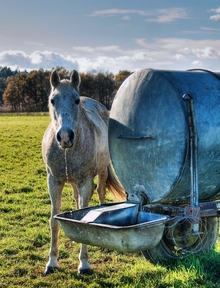With the arrival of spring weather and summer months approaching, the CDC and veterinarians are warning horse owners about the diseases that mosquitoes carry. The incidence of mosquito-related diseases and deaths can be greatly reduced or prevented if precautions are taken to reduce the mosquito population and if mosquitoes carrying diseases such as West Nile virus are promptly identified.

Preventing horse diseases by providing clean water
Experts at the Centers for Disease Control say the early detection of mosquitoes infected with West Nile virus makes it easier to see where the virus is spreading and take early action to halt the spread.
Experts at the Centers for Disease Control say the early detection of mosquitoes infected with West Nile virus makes it easier to see where the virus is spreading and take early action to halt the spread.
Monitoring the rate of infection and the mosquito population size allows health officials to multiply the two numbers and produce a "vector." Experts at the Centers for Disease Control say the "vector" makes it easier to see where the virus is spreading and take early action to slow or halt the spread.
West Nile virus which is commonly transmitted by mosquitoes can cause fever, encephalitis and meningitis in both humans and horses. Although most people and horses that are infected don't display symptoms, a few develop a serious sometimes fatal, neurological illness.
Because of the lack of monitoring of the mosquito population and the fact that it can take three or four weeks before symptoms of infection develop, health officials are far behind in identifying the numbers infected and the spreading effects of the virus.
Experts say global warming trends forecast more epidemics as temperatures increase. Diseases that formerly only occurred in the tropics are moving northward and tend to cluster in affluent housing-dense areas with a high occupancy of homes.
Health officials say that preventing and controlling the virus requires, "an integrated vector management approach" that involves identifying potential breeding sites in winter and spring well before the mosquito season begins.
Regularly cleaning gutters, maintaining swimming pools, and providing good drainage of water around homes, barns, and stables would eliminate many breeding sites and mosquito monitoring and use of targeted pesticides are also key.
It is recommended that horse owners consult their veterinarians for the best vaccine for mosquito-borne diseases, and that horse owners keep their horses indoors during dawn and dusk in addition to ridding nearby areas of standing water.
As with humans, most horses infected with the virus do not show symptoms or become sick, but according to the U.S. Department of Agriculture, in a third of horse-related cases with critical symptoms, the horses die.
Horses that do become sick will often lose coordination and appetite, suffer confusion, fever, stiffness and muscle weakness, particularly in their hindquarters.
In many states, Departments of Health have West Nile virus surveillance systems that include mosquito trapping, testing dead birds for infection and assessing human case activity. The CDC urges the public to report dead birds to the state health department or wildlife agency in their area.
